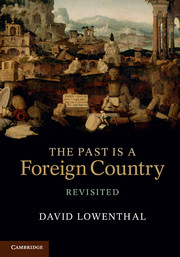Part IV - Remaking the past
Published online by Cambridge University Press: 05 November 2015
Summary
Knowing the past profoundly affects its residues, physical and mental alike. Even safeguarding its integrity transforms historical memory. Historians are inherent revisionists, ‘junkies for change’, as Philippa Gregory puts it. The ancient truism that not even God can change the past leads sceptics to suspect that She created historians to do it for Her.
Every act of recognition alters what survives. Simply to appreciate a memory or to protect a relic, let alone to embellish or imitate it, skews its form and our impressions. Just as recall modifies memory and subjectivity slants history, handling relics refashions their appearance and meaning. Interaction with the past’s residues ceaselessly alters their nature and context, unwittingly if not intentionally.
Such changes can be profoundly disturbing, for they undermine the probity of the past. To validate tradition, to confirm identity, and to make sense of the present requires a securely stable past. ‘To tamper with the past’, reflects an archaeologist, ‘is to bring at times that slipping, sliding, tenuous horror which revolves around all that is done, unalterable, and yet . . . may draw disaster from the air, or make us lonely beyond belief’. Can we trust a past in constant flux, alterable by accident or evolution or at will?
- Type
- Chapter
- Information
- The Past Is a Foreign Country – Revisited , pp. 411 - 412Publisher: Cambridge University PressPrint publication year: 2015

